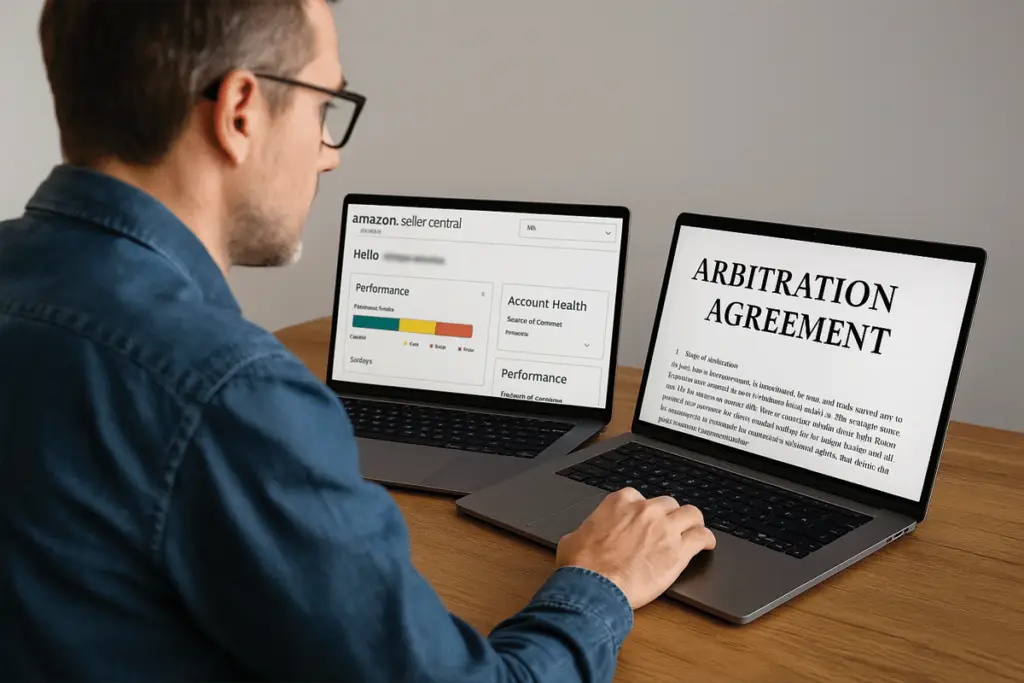Arbitration vs. Litigation for Amazon Sellers: Which One Wins in 2025?

Introduction
When Amazon shuts down your account or withholds your funds, you want answers quickly. But when internal appeals don’t work, what legal remedies are available? In 2025, arbitration will emerge as the most common and accessible legal tool for Amazon sellers.
Yet many sellers wonder: Should I file for arbitration? Or can I sue Amazon in court?
This guide breaks down the differences between arbitration and litigation, which is better for Amazon sellers, and how to decide the best path forward when your business is on the line.
What Is Arbitration?
Arbitration is a private legal process where both parties present their case to a neutral third party, called an arbitrator, who then issues a binding decision.
For Amazon sellers, arbitration is typically required because of the mandatory arbitration clause in Amazon’s Business Solutions Agreement.
Key Features of Arbitration:
Private and confidential
Faster than traditional court proceedings
Binding decisions are enforceable in court
Usually conducted through the American Arbitration Association (AAA)
Often held virtually or by phone in 2025
What Is Litigation?
Litigation is the formal process of suing someone in a court of law. It involves:
Filing a lawsuit
Public hearings and motions
A trial before a judge (and sometimes jury)
The right to appeal
While litigation offers more procedural rights, Amazon sellers typically cannot use this route due to their agreement with Amazon.
Amazon Sellers: Arbitration Is Usually Your Only Legal Option
Amazon’s contract requires sellers to use arbitration for nearly all disputes. That includes:
Account suspensions
Withheld funds
ASIN removals
Breach of contract claims
You cannot file a lawsuit in court against Amazon unless your case falls under a very rare exemption (like certain IP disputes filed in federal court).
Pros and Cons: Arbitration vs. Litigation for Amazon Sellers
| Factor | Arbitration | Litigation |
|---|---|---|
| Time | Faster (usually 4–8 months) | Slower (1–3 years) |
| Cost | Lower (Amazon pays most fees) | Higher (court costs + legal fees) |
| Privacy | Confidential | Public record |
| Appeal Rights | Limited | Broader appeal rights |
| Availability | Required by Amazon | Rarely allowed |
| Control | More flexible process | Strict court rules |
When Should an Amazon Seller File for Arbitration?
Consider arbitration if:
Your account was wrongfully suspended
Amazon is holding significant funds
You’ve exhausted all internal appeals
You’ve received no meaningful response from Seller Performance
Your business is suffering, and you need a binding resolution
Real-World Examples of Arbitration Cases We Handle:
$200,000+ in withheld funds for a seller accused of policy violations
Permanent account suspension for allegedly selling inauthentic products, despite real invoices
Brand registry disputes over IP rights
False-related account suspensions without any connection
Breach of contract claims due to Amazon failing to pay out disbursements
In most cases, arbitration results in either account reinstatement, monetary compensation, or a negotiated settlement.
How to File an Arbitration Claim Against Amazon
Here’s a simplified process:
Review Amazon’s Business Solutions Agreement
Confirm the arbitration clause and your eligibility.
File a Demand for Arbitration
This is submitted to the AAA (American Arbitration Association).
Serve Amazon
Send a copy of your demand to Amazon’s registered legal address.
Select an Arbitrator
Both sides agree on who will hear the case.
Prepare Evidence
Gather emails, invoices, account data, and documentation.
Attend the Hearing
Typically virtual. You (or your lawyer) present your case.
Receive a Decision
The arbitrator issues a binding ruling, usually within 30–60 days.
Why You Should Have Legal Representation
Amazon will be represented by legal counsel during arbitration. You should be, too.
A skilled Amazon seller attorney can:
Draft a professional and persuasive arbitration demand
Present clear legal arguments
Organize your evidence for maximum impact
Handle discovery and negotiation
Improve your chances of a successful outcome
When Litigation May Apply (Rare but Possible)
Although arbitration is required, some IP-related disputes, like trademark infringement against counterfeiters, can go through federal court. This is usually relevant for brand owners using BrandEnforcementLaw.com.
Final Thoughts: Arbitration Is Your Best Option in 2025
If Amazon is holding your money, shutting down your account, or refusing to respond to appeals, don’t waste more time with standard support tickets. Arbitration gives you a path forward—fast, enforceable, and often successful when done right.
📌 Need help filing an arbitration? Contact the legal team at AmazonSellersLawyer.com to take the next step.
